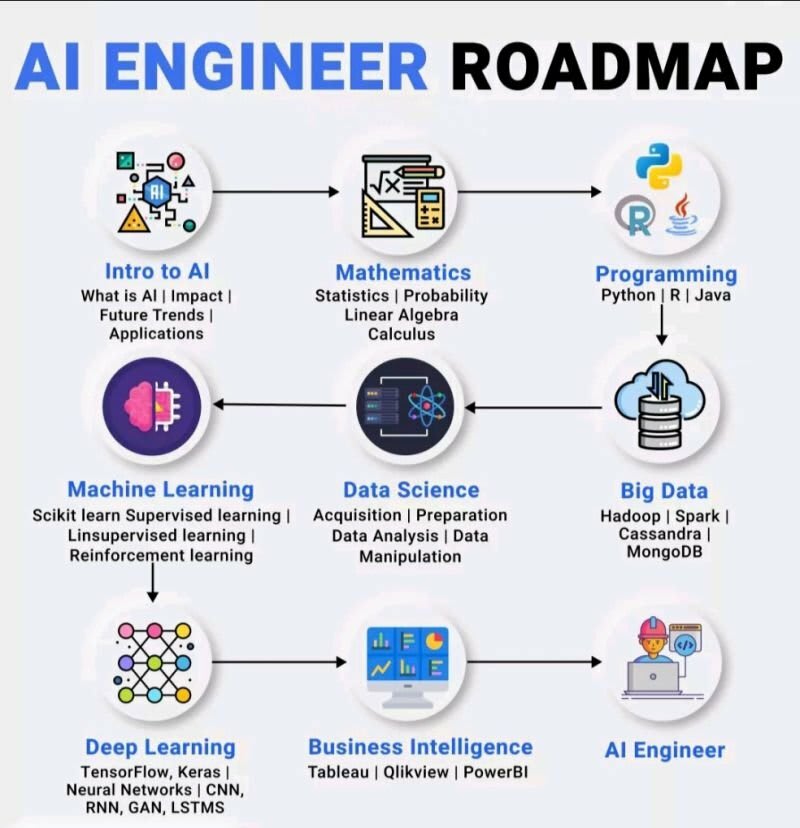Artificial Intelligence (AI) is an exciting field that is transforming various industries. If you're a beginner eager to dive into AI, this blog post will provide you with a beginner-friendly roadmap to guide your learning journey. We'll break down the essential steps to help you understand and master AI concepts gradually.
For more detailed AI Roadmap, check👉 Artificial Intelligence Learning Roadmap- Step-by-Step Guide
Step 1- Grasp the Basics:
Start by gaining a solid foundation in the basics. Familiarize yourself with essential mathematical concepts like algebra, calculus, and probability. Additionally, learn a beginner-friendly programming language like Python, which is widely used in AI. Explore online tutorials and resources to understand the fundamentals of Python programming.
Step 2- Introduction to Machine Learning:
Machine Learning is a crucial aspect of AI. Begin by understanding the concept of supervised and unsupervised learning. Supervised learning involves training models using labeled data, while unsupervised learning deals with finding patterns in unlabeled data. Learn about popular machine learning algorithms such as linear regression and decision trees. Focus on grasping the intuition behind these algorithms before diving into the math.
Step 3-Deep Dive into Deep Learning:
Deep Learning has gained significant popularity in recent years. Start by learning about neural networks, which are the building blocks of deep learning. Understand how neural networks are structured, how they learn from data, and how they make predictions. Explore concepts like activation functions, backpropagation, and gradient descent.
Step 4- Hands-on with Data:
Data is crucial for AI applications. Learn how to manipulate and preprocess data effectively. Discover techniques for cleaning data, handling missing values, and transforming data into a suitable format for training models. Practice working with libraries like Pandas and NumPy, which simplify data manipulation tasks.
Step 5- Introduction to Natural Language Processing (NLP):
NLP focuses on teaching machines to understand human language. Begin with the basics, such as tokenization (breaking text into words or sentences), stemming (reducing words to their root form), and part-of-speech tagging (identifying grammatical elements). Experiment with NLP libraries like NLTK to gain hands-on experience.
Step 6- Dive into Computer Vision:
Computer Vision deals with teaching machines to interpret visual information. Start by understanding image processing techniques, such as filtering and feature extraction. Learn about popular computer vision algorithms like object detection and image classification. Experiment with libraries like OpenCV and TensorFlow to implement computer vision applications.
Check-> Become a Computer Vision Expert–
Step 7- Introduction to Reinforcement Learning:
Reinforcement Learning focuses on training agents to make decisions through trial and error. Begin by understanding concepts like rewards, states, and actions. Learn about popular algorithms like Q-learning and explore environments like OpenAI Gym to practice reinforcement learning.
Step 8- Engage in Projects and Continuous Learning:
Apply your knowledge through hands-on projects. Start with small projects and gradually tackle more complex challenges. Join AI communities and participate in online forums to collaborate with fellow learners and gain insights from experienced practitioners. Stay updated with the latest advancements by following AI blogs, attending webinars, and exploring AI-related news sources.
For more detailed AI Roadmap, check👉 Artificial Intelligence Learning Roadmap- Step-by-Step Guide
Conclusion:
Embarking on a journey to learn Artificial Intelligence as a beginner might seem overwhelming, but by following this roadmap, you can progress gradually and develop a strong foundation in AI concepts. Remember to focus on understanding the fundamentals, practice hands-on with real-world data, and engage in projects to reinforce your learning. Embrace continuous learning and leverage online resources and communities to enhance your skills.



Top comments (0)